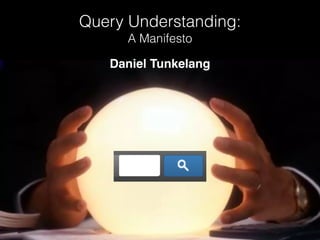
Query Understanding: A Manifesto
- 1. Query Understanding: A Manifesto Daniel Tunkelang queryunderstanding.com
- 2. Overview • What is query understanding? • Query performance prediction. • Query rewriting. • Query suggestions. • Search is a conversation. tl;dr: Query understanding is about focusing less on the results and more on the query.
- 3. Query understanding means figuring out what the searcher wants.
- 4. What query understanding is not: scoring and ranking of results.
- 5. Query understanding means not relying on ranking to filter out irrelevant results.
- 6. Challenge: accurately identify searcher's intent while minimizing searcher’s effort.
- 7. Old-school search: searcher enters query, search engine interprets query.
- 8. Modern search: searcher starts to type, search engine suggests queries.
- 9. And in 2016, modern search means mobile search.
- 10. March Hare: “You should say what you mean.” Alice: “I do. At least I mean what I say.”
- 11. But what if the search engine doesn’t know what the searcher means?
- 12. And how does a search engine achieve the self-awareness to know what it doesn’t know?
- 13. Query understanding is about measuring and optimizing for query performance.
- 14. History is the best teacher. For common queries, learn from historical performance.
- 15. How you define performance depends on why searchers use your site. But define it and measure it!
- 16. Can also learn from similar queries: re-ordered terms, subqueries, similar results, etc.
- 17. Stuck in the long tail? Predict performance from query and result set features.
- 18. Lots of academic work on query performance prediction.
- 19. So you have a poorly performing query. Now what? Rewrite it!
- 20. Rewriting to improve precision: query segmentation, field restriction, query classification. tag: skill OR title related skills: search, ranking, … tag: company id: 1337 industry: internet verticals: people, jobs intent: exploratory
- 21. Rewriting to improve recall: query expansion, query relaxation.
- 22. When query expansion is done right, users barely notice. Query relaxation is risker and should be messaged.
- 23. Query rewriting should improve query performance. If it doesn’t, you’re doing wrong. Measure!
- 24. Rewriting is great when searchers type whole queries. But what about autocomplete and search suggestions?
- 25. Query suggestions have two jobs: reduce searcher effort and improve query performance.
- 26. Searchers are people. People are lazy. All else equal, help them type as little as possible.
- 27. But don’t let searchers be too lazy! It’s easy to create miscommunication.
- 28. Search suggestions offer strong information scent. But searcher may not recognize query ambiguity.
- 29. Reduce the likelihood of a bait-and-switch: only offer high-performance search suggestions.
- 30. Should you score search suggestions based on total engagement or query performance?
- 31. Total engagement is the value delivered by search. But low query performance means unhappy users.
- 32. Can combine as single utility function. Or score using total engagement but require minimum query performance.
- 33. Finally, let’s remember that search is more than a single query and response. It’s a conversation.
- 34. Don’t focus so much on single-query performance that you forget to optimize for the overall journey.
- 35. The best journey is a sequence of small successes. Not a sequence of frustrations followed by success.
- 36. Summary • Query understanding means figuring out what the searcher wants. • Measure and optimize for query performance. • Use query rewriting to improve precision and recall, in order to improve query performance. • Query suggestions have two jobs: reduce searcher effort and improve query performance. • Search is a conversation. tl;dr: Query understanding is about focusing less on the results and more on the query.
- 37. Thank you! Learn more at queryunderstanding.com!
